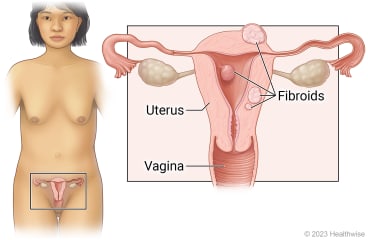
Overview
Uterine fibroids are growths in the uterus. Fibroids aren't cancer. Doctors don't know what causes fibroids. But they are more common as you age, especially from your 30s and 40s and through menopause. After menopause, fibroids often shrink and go away.
Fibroids can grow on the outer wall, on the inner wall, or inside the wall of the uterus. They can cause painful cramps and heavy periods. In these cases, an intrauterine device (IUD) can help decrease symptoms. It can also help to take anti-inflammatory medicines or hormone birth control. Sometimes surgery is needed to treat fibroids. But if you are near menopause, you may want to wait and see if your symptoms get better.
Follow-up care is a key part of your treatment and safety. Be sure to make and go to all appointments, and call your doctor if you are having problems. It's also a good idea to know your test results and keep a list of the medicines you take.
How can you care for yourself at home?
- If your doctor gave you medicine, take it as exactly as prescribed. Be safe with medicines. Call your doctor if you think you are having a problem with your medicine.
- Take anti-inflammatory medicines for pain. These include ibuprofen and naproxen. Read and follow all instructions on the label.
- Use heat, such as a hot water bottle or a heating pad set on low, or a warm bath to relax tense muscles and relieve cramping. Put a thin cloth between the heating pad and your skin. Never go to sleep with a heating pad on.
- Lie down and put a pillow under your knees. Or lie on your side and bring your knees up to your chest. These positions may help relieve belly pain or pressure.
- Keep track of how many sanitary pads or tampons you use each day.
- Get at least 30 minutes of exercise on most days of the week. Walking is a good choice. You also may want to do other activities, such as running, swimming, cycling, or playing tennis or team sports.
- If you bleed longer than usual or have heavy bleeding, take a daily multivitamin with iron.
When should you call for help?
Call your doctor now or seek immediate medical care if:
- You have severe vaginal bleeding.
- You have new or worse belly or pelvic pain.
Watch closely for changes in your health, and be sure to contact your doctor if:
- You have unusual vaginal bleeding.
- You do not get better as expected.
Where can you learn more?
Go to http://www.healthwise.net/patientEd
Enter B121 in the search box to learn more about "Uterine Fibroids: Care Instructions".
Current as of: May 5, 2025
Author: Ignite Healthwise, LLC Staff
Clinical Review Board
All Ignite Healthwise, LLC education is reviewed by a team that includes physicians, nurses, advanced practitioners, registered dieticians, and other healthcare professionals.

